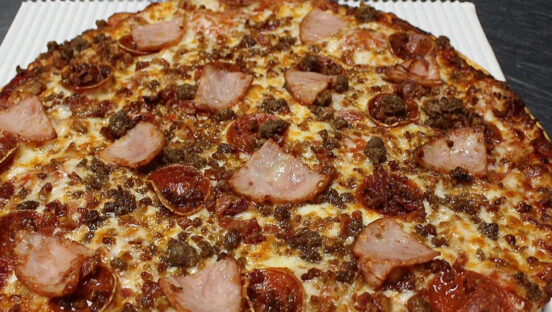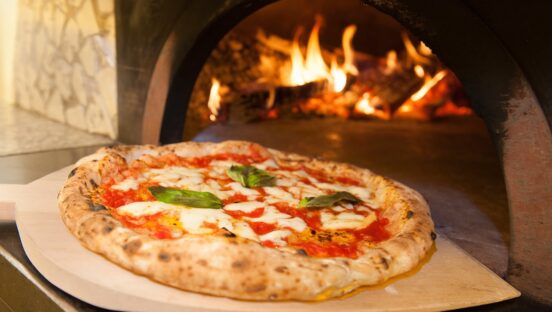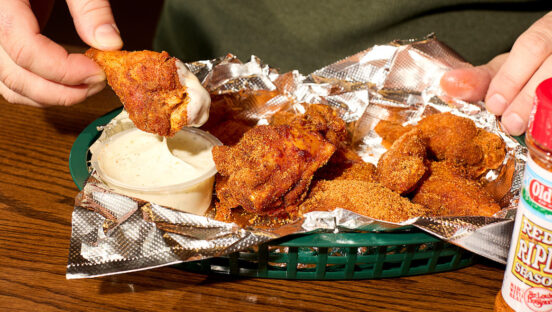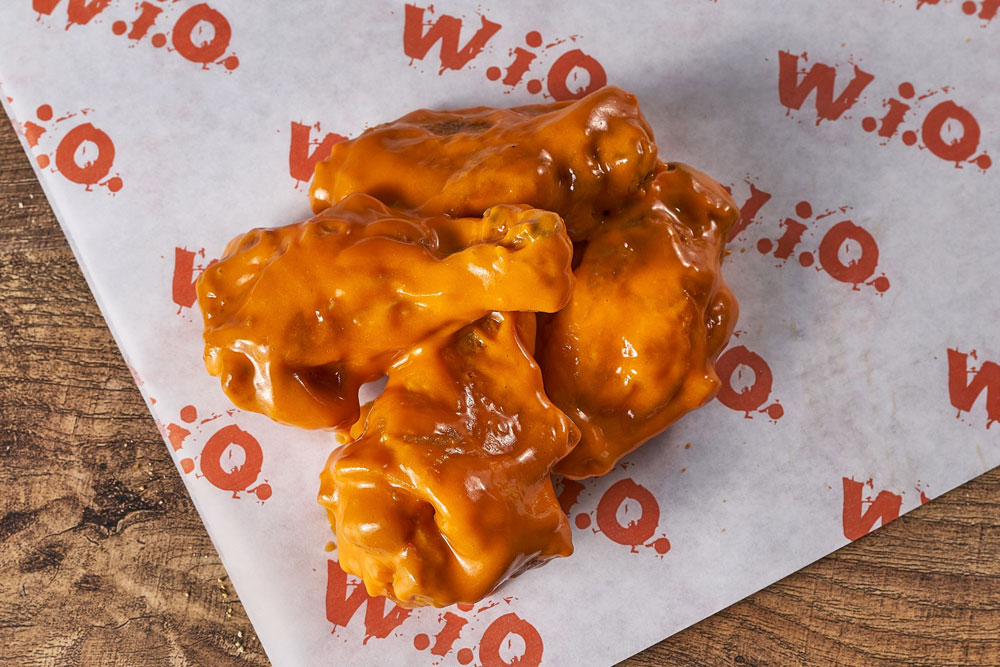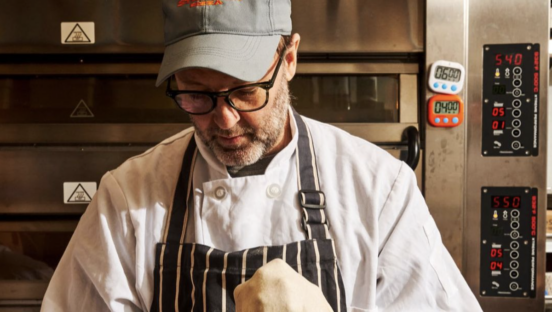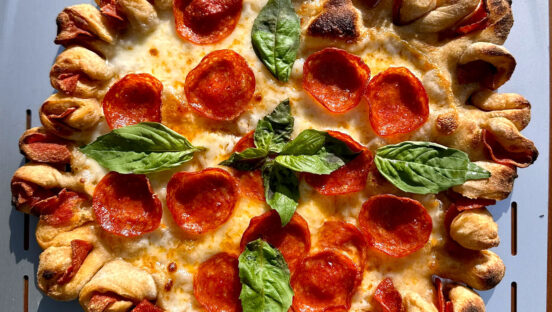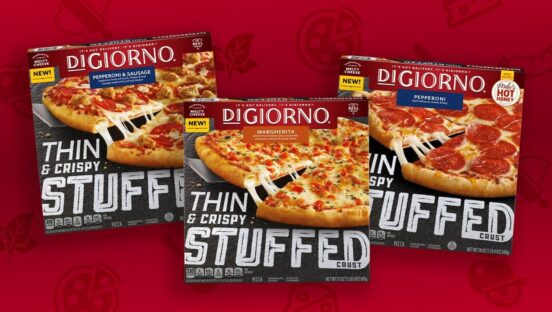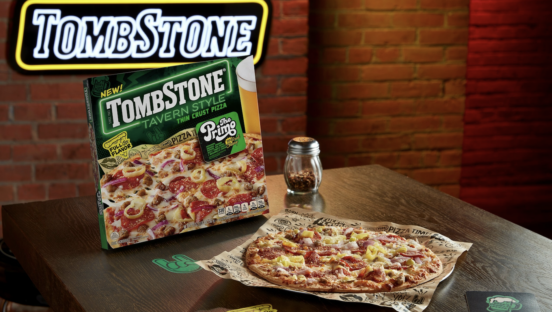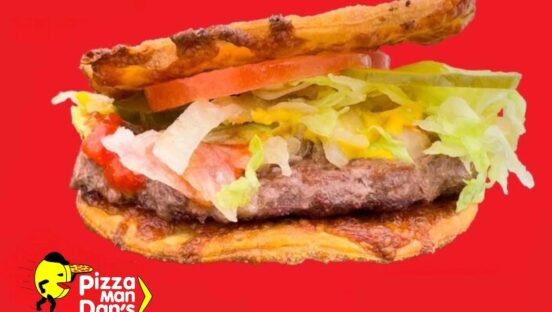 John Arena, co-owner of Metro Pizza (metropizza.com) in Las Vegas, could hurt you if he wanted to. With 42 years of training in Japanese martial arts, he could take you down with a swift karate chop to the neck or shatter your wrist with a pair of nunchakus. And if one of his pizzerias ever moved into your neighborhood, you’d better put up your dukes, because you’d be in for a real fight. Metro Pizza makes new fans—and positive headlines—everywhere it goes.
John Arena, co-owner of Metro Pizza (metropizza.com) in Las Vegas, could hurt you if he wanted to. With 42 years of training in Japanese martial arts, he could take you down with a swift karate chop to the neck or shatter your wrist with a pair of nunchakus. And if one of his pizzerias ever moved into your neighborhood, you’d better put up your dukes, because you’d be in for a real fight. Metro Pizza makes new fans—and positive headlines—everywhere it goes.
Luckily, Arena doesn’t want to hurt anybody. Soft-spoken and friendly, he ambles through his day-to-day affairs with Zen-like composure and a curious, open mind. But don’t mistake his easygoing nature for laziness—the man knows how to get things done. With his longtime business partner and cousin Sam Facchini, Arena operates five highly successful Metro Pizza locations in and around Las Vegas. He also teaches the country’s only accredited, college-level course on the pizza restaurant business at the University of Nevada, Las Vegas and leads monthly pizza making classes at his restaurants. He’s even made pizzas for three U.S. presidents (Carter, George W. Bush and Obama), a fact that he doesn’t even bother to mention in interviews until the cameras and recorders have been turned off.
That’s enough to keep any pizzaiolo busy, but Arena has recently set his sights on a new—yet ancient and pleasingly familiar—line of work: the bakery business. Arena believes that pizza making and bread baking go together like, well, flour, water, salt and yeast. And as the public’s demand for artisan, handcrafted foods continues to rise, his latest concept, Lulu’s Bread & Breakfast (lulusonthemove.com), is uniquely positioned to capitalize on the trend. A full-service bakery and breakfast/lunch eatery, Lulu’s features a smorgasbord of hearth-baked goods, unique sandwiches and delectable desserts, blending old-world baking traditions with modern marketing savvy. Offering a menu hailed by Las Vegas Weekly as “a collection of bliss-inducing, homey dishes that dance along the spectrum of brunch,” Lulu’s is helping to usher in a new era of culinary artisanship—not to mention a potential new revenue stream for pizzeria operators looking to expand their businesses.
From New York to Vegas
A Brooklyn, New York, native who worked in his father’s pizzeria as a child, Arena likes to make money as much as the next guy, but what he really likes to make is pizza. While most of us fondly recall our first kiss, he waxes nostalgic about his first pizza sale. “When my dad and I made our first pizza together, he guided me through it and helped a lot,” he says. “Then we cut the pizza, put it in a box, and it went to a customer. The first pizza I ever made got sold. That was magic. Someone was willing to spend money on something I made with my own two hands.”
In the early 1980s, Arena and Facchini moved to Las Vegas and took over a restaurant called Original New York Pizza, then opened the first Metro Pizza in 1986. A second location followed in 1988, and a third in 2000. Despite their backgrounds, the partners aren’t snobs about the New York pizza style or any other style. “I think we’re popular because we honor the great traditions of pizza making,” Arena says. “We’re in a community where everybody comes from somewhere else, with their own ideas of what pizza is supposed to be based on their backgrounds. Rather than try to fight that, we’ve tried to embrace it and honor it.”
Thus, Metro Pizza’s eclectic menu spans a range of styles, with many of the pies inspired by the owners’ favorite pizzerias in other cities. A map in the restaurant lists landmark pizza shops across the United States, as well as those recommended by customers. “We want people to walk in here for the first time and feel like they’ve been coming here forever, because something here reminds them of the pizza place they knew before,” Arena says.
| The Pizza Professor |
| John Arena’s course in pizzeria management at UNLV is the only one of its kind in the country.
By Melanie Addington If earning college credit to learn about pizza wasn’t a good enough idea, Las Vegas pizzaiolo John Arena takes it a step further by serving pies and appetizers in every class. He teaches the University of Nevada Las Vegas course, The Culture of Pizza, at his Metro Pizza restaurants, where students gather weekly to hear lectures by Arena and spend time with guest speakers. “The class grew from a series of guest lectures delivered to hospitality students at UNLV,” he says. “Over time, it has evolved and now covers not only history, but also culinary skills, pizzeria concept development and management. I felt there was a need to educate and contribute to an improved perception of our industry with young people entering the hospitality field.” Each class must create a new pizzeria concept, covering everything from financing and construction to menu development and marketing. One class designed a Vegas-style venue with artisanal pizza, flair-minded bartenders, servers who could sing and dance, and dough spinning acrobats. At the semester’s end, the class presented its concept to Chris Decker, a local restaurateur; Kathy Jacobi, president of the Nevada Restaurant Association; and Brad Brennan, whose family owns several landmark restaurants in New Orleans. “We want people to understand that pizza is a legitimate profession,” Arena says. “What better way to do that than to teach it in a university setting and approach it in a methodical way with real standards? The students leave the course with a newfound respect for pizza and for everything that goes into creating a successful pizza concept. And that’s what we need. We need people who aren’t looking at pizza as the illegitimate stepchild of the restaurant business. When people realize running a pizzeria takes a lot of skill and knowledge, that will start to elevate our profession. That’s how we’ll get respect.” |
Monetizing a Dormant Daypart
Something about freshly baked bread brings back happy memories, too. Not to mention that most pizzerias are already fully equipped to add baked goods to their repertoire. Even better, selling breads, croissants and other baked goods creates a moneymaking opportunity during an otherwise dormant daypart. “We looked at when and where we were making our money,” Arena recalls. “We pay rent or mortgage on our buildings 24 hours a day, but we had this entire daypart where we weren’t making any money—breakfast. From 6 until 11 in the morning, people were eating, but they weren’t eating with us.”
Unfortunately, breakfast pizzas haven’t exactly sold like hotcakes for other would-be innovators. “People don’t usually go to a pizzeria for breakfast—it’s just not in their mind-set,” he notes. “To successfully launch a breakfast daypart, we knew we had to have a bakery/café that would feel more familiar to people as a breakfast place. We were already buying dessert items and bread, so we thought we could make those ourselves as signature items.”
To test the concept, Arena and Facchini started with a food truck, called Lulu’s On the Move, in 2010, serving breads and pastries at high-profile events around the city and participating in cooking competitions. Before long, Lulu’s (named for Arena’s mother, Lucy) had been featured on the Food Network and the Cooking Channel and in Gourmet. Along the way, they sought customer feedback, fine-tuned their recipes and built a loyal following.
Lulu’s Bread & Breakfast opened last spring in a building connected to Metro Pizza’s Sky Pointe Drive location. It has its own separate entrance, but the bakery and pizzeria share an interior doorway. “We did that on purpose,” Arena says. “Lulu’s closes at 3 in the afternoon, so we can then use it for private parties and catering events for the pizzeria.”
Lulu’s has its own kitchen, equipment and staff. It seats 40 customers, but when larger crowds pour in on weekend mornings, the pizzeria can accommodate the overflow. Arena and Facchini bought in expert consultants to help develop the menu, which includes breads, croissants, pastries, breakfast and lunch sandwiches, wraps, frittatas and salads, along with coffee, espresso and small-batch sodas. The menu changes every week, but certain types of bread are perennial favorites, including country French bread; Italian styles such as Toscano and Sesame Semolina; baguettes; brioche; walnut raisin; seasonal breads, such as Cranberry Pumpkin Seed for Halloween and Thanksgiving; and pretzel bread. “Brioche is probably our most popular one because people use it for hamburger buns,” Arena says. “Pretzel bread is also very popular, although it’s a challenge to make because the process involves dipping the bread in lye, so it’s dangerous to the baker.”
The rotating menu features other crowd-pleasers as well, including apple and cherry turnovers; peach French toast with fresh raspberries; bagels with carrot cake cream cheese; Buffalo chicken chowder; a grilled brie-and-cranberry sandwich; and the Black Friday Morning, an open-faced roast turkey sandwich with crumbled sausage, Havarti cheese, two eggs and a side of cranberry jalapeno relish.
“The menu evolved from the feedback we’d gotten on the food truck,” Arena adds. “We had seen what worked and what didn’t work, talking to our customers face-to-face every day. We had two-and-a-half years of that kind of feedback before we opened, which was invaluable.”
Following the Formula
Arena emphasizes that any pizzeria with standard pizza making equipment can add a baking component. “Everything’s already there in your kitchen,” he says. “Just like with pizza, it’s mixers and ovens, plus flour, water, salt and yeast, and you’re a bread maker.” But there’s a caveat: Pizza making and bread baking are very different disciplines, he warns.
“Pizza makers talk about having great dough recipes,” he says. “Bakers talk about formulas. A formula implies precision—you follow the formula exactly in terms of cooking times, ingredients, temperature. I know pizza makers who don’t measure anything—they go completely by feel. Bakers can’t do that. There may be a little intuitive knowledge, but the formula is critical.”
Baking some items can be complicated, time-consuming and carried out in several stages. “You’ve got some starters that have been developing for years,” Arena adds. “You’ve got slow fermentation, shaping, multiple stages of mixing at different speeds for different lengths of time. Once you start mixing a particular batch, there could be an 18-hour process before it actually goes in the oven.”
In other words, errors in the kitchen can be expensive in terms of money and precious time. That’s why bread bakers at Lulu’s go strictly by the book—literally. Every formula has been recorded in recipe books, and employees are not permitted to rely on memory alone. “If you have 14 different breads on the menu and you think you’ll have all of those formulas committed to memory, you’re wrong,” he says. “When I walk through the kitchen and they’re making a batch of dough, I look for that recipe book to be out.”
The final product isn’t cheap to make; Arena knows he has to price accordingly, and he is unapologetic about it. “That’s the biggest mistake people in our industry make,” Arena adds.
“They’re looking at their competition and saying, ‘I have to charge what they charge.’ I’m not interested in what the guy down the street is charging. I have to base what I charge on my expenses, the type of facility I provide, the type of atmosphere, the ingredients I use. I’m using the most expensive ingredients available, so it stands to reason that I’ll be higher-priced than the guy who’s not using those ingredients. You can’t be for everybody. Our customer is someone who’s willing to pay a little more for a particular level of quality.”
 A Home Away From Home
A Home Away From Home
Metro Pizza is well-known for a marketing calendar that’s packed with promotions, events and specials, and Arena and Facchini strive to build a sense of community at Lulu’s as well. The bakery’s Facebook page, which already boasts 1,547 likes, features positive, uplifting messages about compassion and kindness, plus tantalizing photos and descriptions of new menu items that give customers a reason to get out of bed in the mornings. Monday Morning Quarterback specials promise 25% discounts on bread, pastries and breakfast items, and
every day brings new goodies, such as Fluffernutter cookie sandwiches and chocolate cherry bread.
The Lulu’s team celebrated Father’s Day last summer with an Elvis Presley theme, whipping up peanut butter-stuffed banana-bread French toast and inviting customers to “treat your dad like a king.” In late January, Lulu’s even created Super Bowl cake pops, tasty pastry confections shaped like footballs and designed for game-day parties.
But Arena doesn’t just want to fill his guests’ bellies with epicurean delights—he wants to get to know them personally and build a large, extended family that thinks of Lulu’s as a home away from home. That’s why he offers regular baking classes for adults and children, sharing his expertise in making bread, cookies and pies. “It’s all about community involvement—bringing little kids in and teaching them how to make their own chocolate chip cookies and building those relationships with the parents. That’s the fun part,” Arena says.
Each class is limited to 12 people, allowing for plenty of one-on-one interaction. Participants acquire a new skill that they can pass on to their loved ones, fostering the time-honored tradition of baking for generations to come. “I learned these things as a child and took it for granted that everyone grew up like that,” Arena says. “It hadn’t dawned on me that there was a whole generation that didn’t learn them from their parents and grandparents. And they missed it. So they’re coming to us now to learn these things. It’s very gratifying to teach people to do these things that have almost become forgotten in our country.”
The Time Is Right
Above all, Arena treasures the spiritual experience of baking bread and sharing it with others. “Bread and life are synonymous,” he muses. “Don’t we all talk about breaking bread together? Obviously, there’s a religious element, too—bread in some ways is sacred, even in a secular sense. And there’s also an emotional connection—the fragrance of bread coming out of an oven can bring you back to an earlier, happier time of your life. I think that resonates with people.”
If there was ever a good time to get into the baking business, it’s now, Arena says. “People are much more food-savvy, thanks to what they see on food-focused TV shows, magazines and websites. And despite all of the vast technology at our disposal, they still feel connected to foods that are made by hand and show the hand of the person that made them. They’re starting to realize that this stuff that’s full of unpronounceable chemicals and comes in plastic bags isn’t really bread. Even these mass-produced breads being sold as artisan breads in grocery stores aren’t really artisan breads. Just because it comes in a brown paper bag doesn’t make it artisan bread.”
And the customers who appreciate these classic bread making traditions will reach a little deeper into their wallets to buy what they want. “Just as there has been an artisan pizza movement, a return to handcrafted pizza, there’s a renewed interest in handcrafted bread as well,” Arena says. “There is a more receptive audience for it. So this is the right time for it.”
Arena is certainly doing his part to spur a full-blown artisan bread movement with his baking classes. And he says he won’t mind a bit if one of his protégés one day opens a competing store in his area. “Some of them are aspiring bread bakers and want to open their own bakery, and that’s OK with me,” he says, exuding his trademark calm. “I don’t think of people who do the same thing I do as competitors. I think of them as colleagues.”




